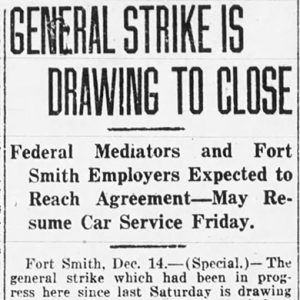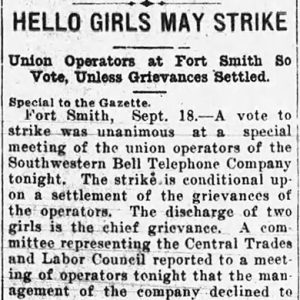calsfoundation@cals.org
Fort Smith Telephone Operators Strike of 1917
On September 19, 1917, women who were employed as telephone operators by the Southwestern Bell Telephone Co. in Fort Smith (Sebastian County) left their stations, walked out of the exchange, and began striking. This strike was a response to the company’s dismissal of two employees, Nora Boger and Mamie Garret, due to their involvement with the creation of a labor union for the operators. When the company denied the reinstatement of these women, the strike began. Over the next four months, the company would wage court battles against the strikers instead of listening to their demands, and conciliators from the Department of Labor would be called in to help solve the conflict. While the strike itself was tumultuous and disrupted the daily life of virtually every citizen in Fort Smith, it was the far-reaching consequences of the strike, including an election, that tore the city in two.
Throughout the course of the strike and the court battles that ensued, the mayor, J. H. Wright, and chief of police, Jim Fernandez, were removed from office and charged with various crimes. The removal of the mayor led to an election for the citizens of Fort Smith to select a new leader. Essentially, this election turned into a battle between pro-labor and pro-business factions of the city. Pro-business leaders formed the League for the Enforcement of Law to protect the city from anarchy and corruption brought on by fraudulent city officials—or so they claimed. In reality, it appears the league was used as a front to gain more support for their candidate, Arch Monro, and discredit the other candidate, ironically the ousted ex-mayor himself. (Interestingly, once the election was over, the league disappeared from newspaper articles and did not seem to have any sort of influence or involvement in city issues.)
Women did not have full voting rights in Arkansas at this time, but state officials had decided earlier that year to allow women to vote in primary elections if they paid the required poll taxes. Thus, when the mayoral election took place in November, women who had paid the taxes were able to vote in the primary. It is vital to note that the women who paid these taxes had no way of knowing this election would happen, and there were no elections scheduled in 1917 when it was time to pay the tax. Because of this, it is safe to assume that the only women who paid the poll tax were those with enough means and disposable income to pay a tax not specifically related to an election at that time. Many of the wealthier men and women in Fort Smith joined the League for the Enforcement of Law prior to the election because of their pro-business stance. The women who were able to vote because of the paid tax were likely voting for the candidate endorsed by the league. And indeed, Monro won the primary election and went on to be the only name on the official ballot later that month. Many in Fort Smith credited the presence of the women’s votes in the primary for his victory.
After the election, Mayor Monro attempted to schedule a meeting between Southwestern Bell and the labor council in hopes of avoiding a general strike across all industries in the area. As with previous conciliatory efforts between the two entities, however, Monro’s attempts were futile, and no meeting occurred. Representatives from the Department of Labor also attempted a meeting with no success. Even repeated appeals from the governor, labor leader Samuel Gompers, and many senators could not get the company to agree to meet with the labor council.
In the end, industries across the area joined a general strike that effectively shut the city of Fort Smith down for nine days and disrupted vital war efforts in surrounding coal mines. Federal conciliator Robert Keating convinced the labor council, and the striking women, to return to work with the promise that he would continue to negotiate with the company to meet as many of their demands as possible.
On December 27, 1917, the Fort Smith telephone operator strike that shut down phone and emergency services for four months, caused an unexpected mayoral election, and stopped war industries in the area for several days finally ended. However, after a year of attempted negotiations, Keating was unable to convince the company to give any concessions to the strikers, and the telephone operators did not receive any of their requests.
For additional information:
Fort Smith Times Record, September–December 1917.
Schmidt, Kyra. “Hello Girls on Strike: Telephone Operators, the Fort Smith General Strike, and the Struggle for Democracy in Great War Arkansas.” MA thesis, University of Arkansas, 2020. Online at https://scholarworks.uark.edu/etd/3705/ (accessed July 6, 2022).
Southwestern American, September–December 1917.
Kyra Schmidt
Owasso, Oklahoma









Comments
No comments on this entry yet.